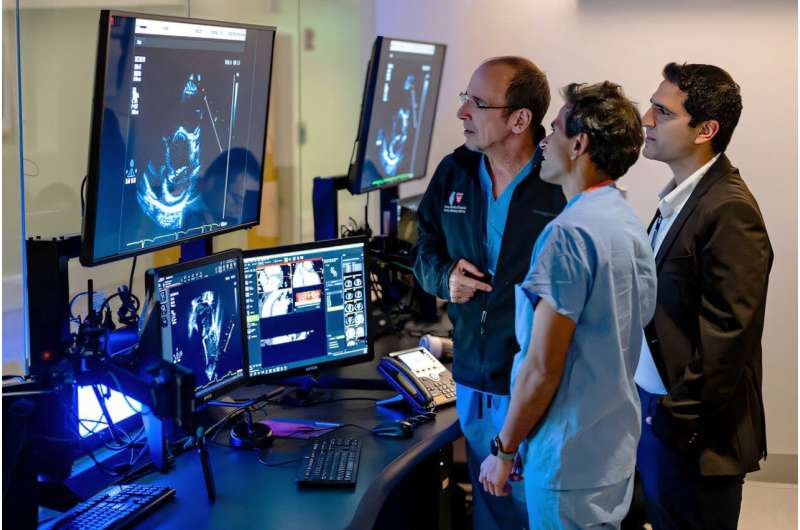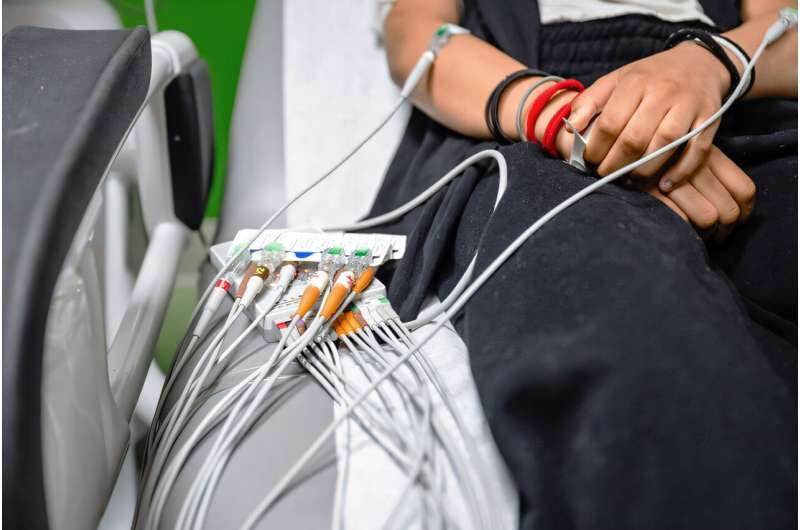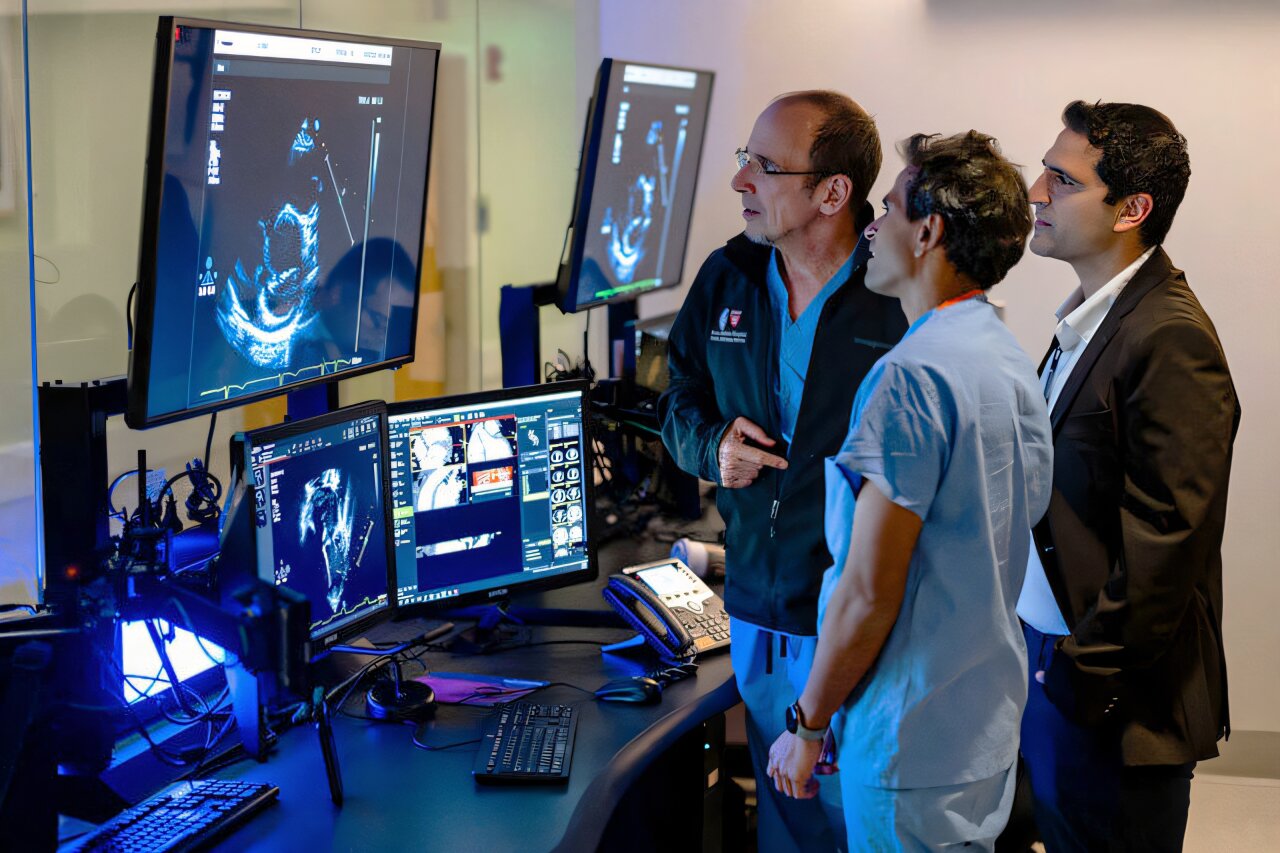
Drs. John Triedman, Sunil Ghelani, and Josh Mayourian (from left to right) envision AI benefitting all cardiologists. Credit: Drew Lederman Photography
In many low- and middle-income countries, pediatric cardiologists can’t help children with congenital heart conditions because of a critical hurdle. They don’t have easy access to advanced diagnostic technology.
With studies showing that as many as 90% of children in those countries receive limited heart care, a new Boston Children’s initiative aims to close that gap by creating and using artificial intelligence (AI) tools that can support pediatric cardiology care worldwide.
Cardiology fellow Joshua Mayourian, MD, Ph.D., and cardiologist John Triedman, MD, have launched the Congenital Heart Artificial Intelligence (CHAI) Lab. It’s one of the first labs to bring together heart specialists, computer scientists, and data experts to design AI tools specifically for diagnosing and managing pediatric heart conditions.
“We have ample resources at Boston Children’s to provide meaningful clinical care,” Mayourian says. “But in other areas of the world, many cardiologists don’t have the means to reach the diagnoses we can. These AI tools can help cardiologists predict heart disease early so they can get children the care they need sooner.”
AI predicts heart health with a simple ECG
One of the CHAI Lab’s first goals was to apply AI to a diagnostic test that’s cheap, widely available, and easy to use: the electrocardiogram (ECG). It records the heart’s electrical activity and requires only a few small sensors that are placed on the body.
“An ECG may seem basic,” Mayourian says, “but it actually holds a lot of important information. With AI, we can analyze the ECG in new ways to learn not just about the heart’s rhythm, but also its pumping ability and possible structural conditions.”
Even though it’s not as detailed as an echocardiogram, an AI-powered ECG (or AI-ECG) can reveal significant insights. The CHAI Lab has already published research detailing how AI-ECGs can help detect heart conditions in children and adults who have congenital heart disease.
One study, featured in JACC: Clinical Electrophysiology, described how one of their AI-ECG models can interpret heart rhythms at an expert level. In fact, that AI-ECG model did better than commercial ECG software at spotting serious conditions like Wolff-Parkinson-White (WPW) syndrome and long QT syndrome, which can increase the risk of sudden cardiac arrest. Experts generally agreed more often with the model’s interpretations than those of experienced heart doctors.

Credit: Children’s Hospital Boston
AI detects a condition the human eye can’t see
Every few months, the lab develops a new AI-ECG model and studies how it works. For simple cases, such as abnormal heart rhythms, AI looks at the same patterns that doctors would. But in more complex cases, the AI picks up on subtle signals that even trained doctors can’t detect.
For example, one of their models could predict if a child’s heart was not squeezing normally, a condition known as ventricular dysfunction, just from ECG data—a finding Mayourian, Triedman, and others outlined in The Lancet Digital Health.
To detect ventricular dysfunction, AI focuses on the QRS complex component of an ECG. “The AI is detecting subtle changes in how the heart muscle activates, which could be linked to poor heart function,” Mayourian says.
AI-ECG could narrow the global technology gap
An ECG machine is affordable and easily available. Almost any hospital or clinic across the globe can get one.
That’s why Mayourian and Triedman believe AI-ECG has vast potential, especially in areas that don’t have enough heart doctors. Needing only the readings of their patients’ ECG tests, doctors could use the lab’s AI-ECG models to identify which children need urgent care and make better use of their limited resources.
The lab’s AI-ECGs might make it easier to screen large groups of children, maybe during sports physicals or when checking for conditions that could lead to sudden cardiac arrest. These ideas have been around for years, Mayourian says, but they’ve been hard to put into practice because of a shortage of heart specialists. AI could help solve that problem.
To ensure the CHAI Lab’s AI tools are used safely and responsibly, Mayourian and Triedman aim to test the models on diverse populations and collect feedback from doctors and patients to improve trust in AI.
Sharing decades of knowledge with the world
One of the CHAI Lab’s biggest strengths is its access to Boston Children’s massive, secure medical database. The database includes detailed patient records, heart images, and other medical data collected over the past six decades. Some of the data is organized using the hospital’s unique Fyler code system, which allows the AI models to analyze extensive data about specific heart conditions.
Because the data is anonymized, the CHAI Lab can use it to train AI tools that learn from thousands of patient cases, allowing the team to study how the care of congenital heart disease changes over time and how treatments work in the real world.
“We’re lucky to have so many experts here in Boston,” Mayourian says. “But we can’t send them everywhere. Our goal is to use AI to share what we’ve learned and help improve heart care for kids everywhere.”
More information:
Joshua Mayourian et al, Expert-Level Automated Diagnosis of the Pediatric ECG Using a Deep Neural Network, JACC: Clinical Electrophysiology (2025). DOI: 10.1016/j.jacep.2025.02.003
Joshua Mayourian et al, Electrocardiogram-based deep learning to predict left ventricular systolic dysfunction in paediatric and adult congenital heart disease in the USA: a multicentre modelling study, The Lancet Digital Health (2025). DOI: 10.1016/j.landig.2025.01.001
Provided by
Children’s Hospital Boston
Citation:
AI tools can address critical gap in pediatric heart care for underserved children globally (2025, September 4)
retrieved 4 September 2025
from https://medicalxpress.com/news/2025-09-ai-tools-critical-gap-pediatric.html
This document is subject to copyright. Apart from any fair dealing for the purpose of private study or research, no
part may be reproduced without the written permission. The content is provided for information purposes only.

